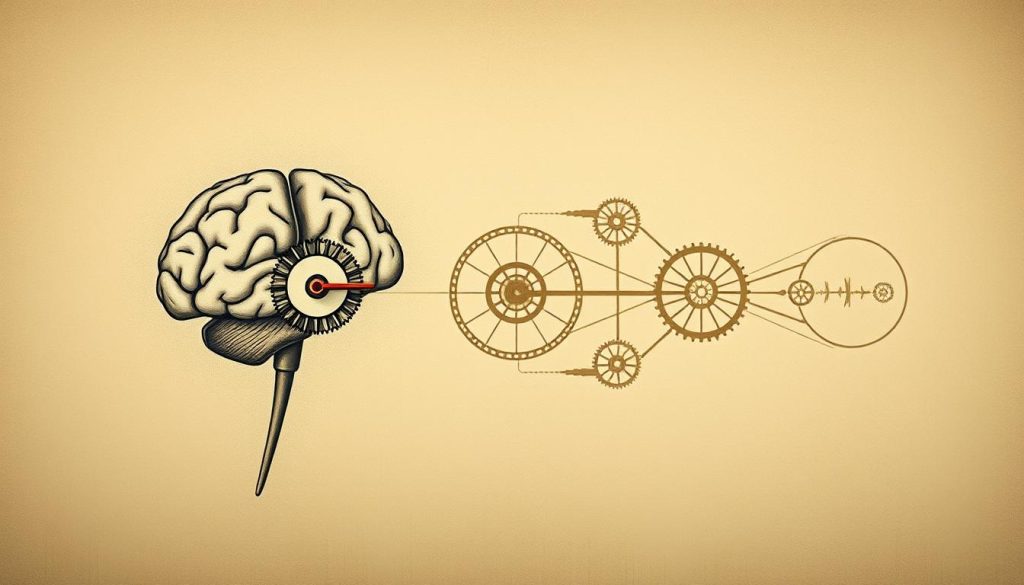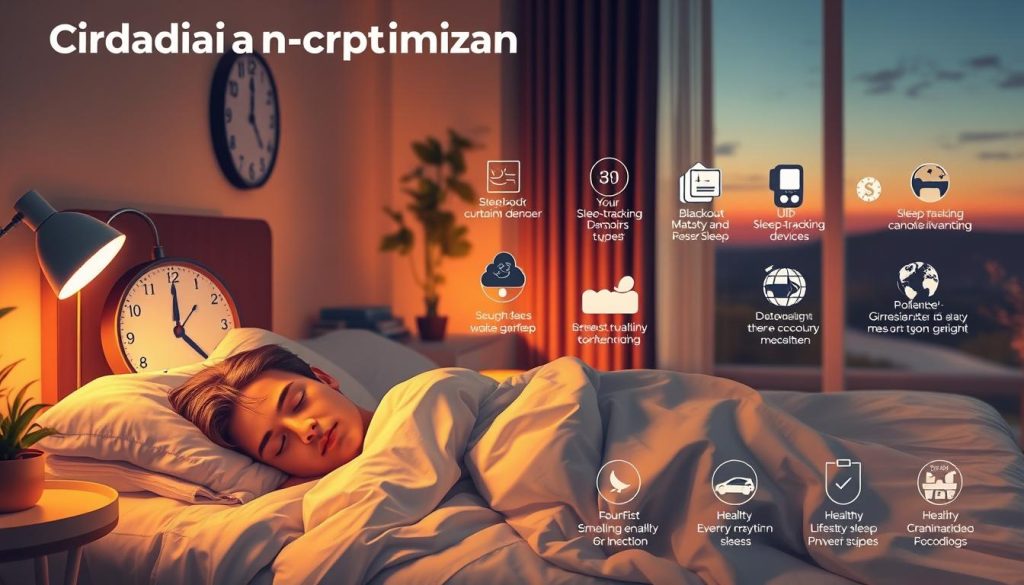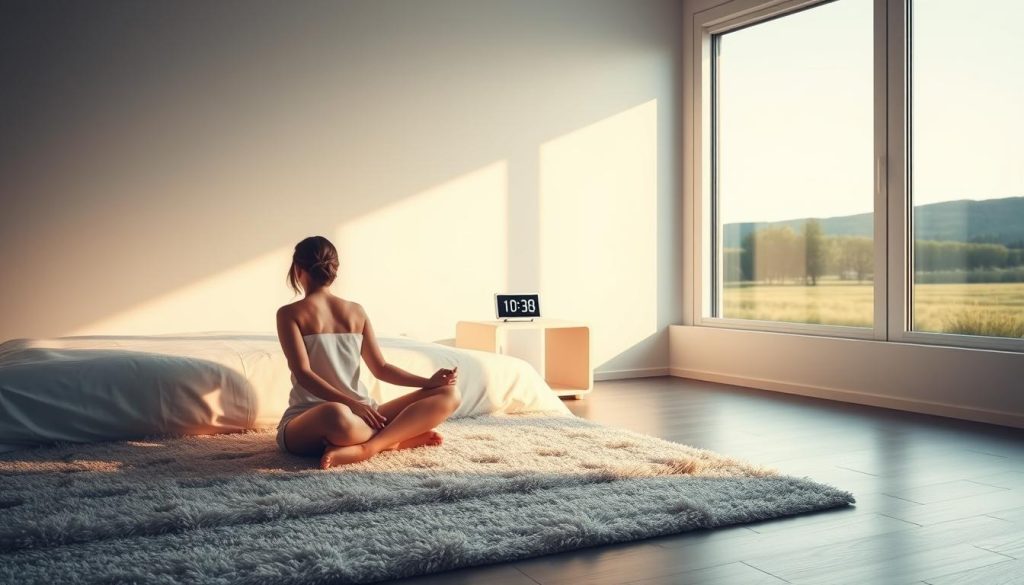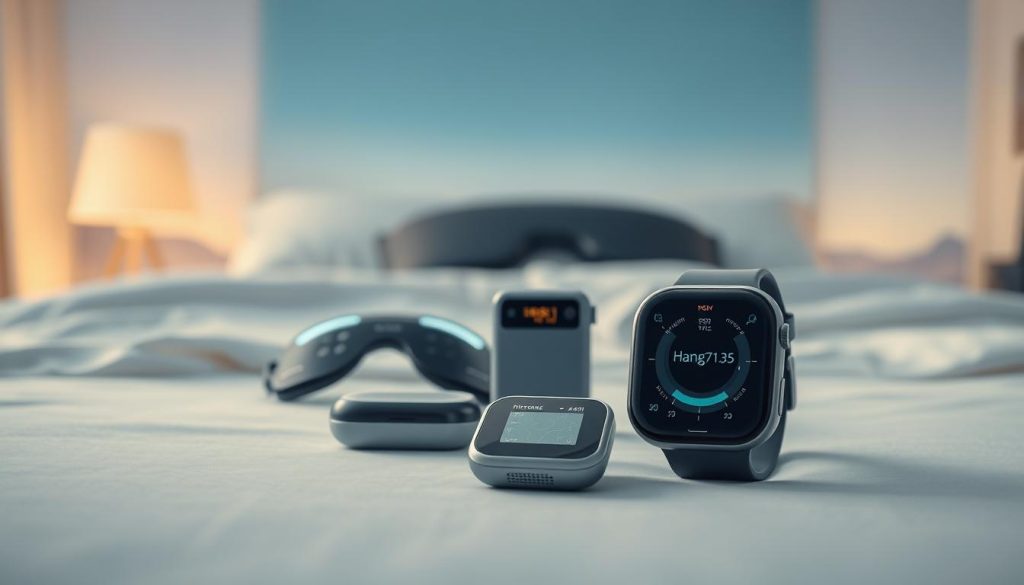Your internal clock does more than just tell you when to sleep. It controls your energy, hormone levels, and health. When it’s working right, you wake up feeling fresh and stay focused all day.
But modern life messes with our natural cycles. Late-night screens confuse our brains. Unusual work hours mess up our sleep. And always being connected keeps our minds racing when we should relax.
But there’s hope. You can take back control of your body’s clock. Biohacking doesn’t need fancy gadgets or hard plans. Simple, science-backed methods can help you naturally reset your body’s rhythm.
This guide will teach you easy ways to improve your internal timing. You’ll learn how to work with your body’s natural rhythm. Get ready to boost your energy, sleep better, and feel better overall.
Understanding Circadian Rhythm and Its Importance
Chronobiology shows how your internal clock affects mood and metabolism. It’s not just about when you’re sleepy or alert. It controls a complex set of processes that keep your body working well.
Your circadian rhythm affects hormone release, body temperature, and immune system function. When it works right, you have energy during the day and sleep well at night. But disruptions can harm your health and well-being.

What is Circadian Rhythm?
Your circadian rhythm is a 24-hour internal clock. It’s found in all living things, from bacteria to humans. The term “circadian” means “about a day” in Latin.
In your brain, a special area called the suprachiasmatic nucleus controls this clock. It syncs with smaller clocks in your body. This ensures your body works at its best.
Light is key to keeping your clock in sync with the world. Morning light helps you feel awake. This is why bright light in the morning is important.
The Science Behind Sleep Cycles
Your sleep goes through cycles that repeat all night. Each cycle lasts about 90 minutes. It includes light sleep, deep sleep, and REM sleep, where you dream.
Deep sleep is when your body repairs itself and releases growth hormone. Your brain also cleans out waste. REM sleep helps with memory and emotions.
Your circadian rhythm controls when you feel sleepy and wake up. This natural cycle supports physical and mental health.
Impact on Health and Well-Being
A good circadian rhythm does more than just help you sleep. It supports metabolism, immune function, and heart health. People with regular sleep patterns have better blood sugar and less inflammation.
Mental health also depends on your circadian rhythm. Bad sleep patterns can lead to depression and anxiety. Your brain needs sleep to regulate emotions and handle stress.
Long-term disruptions can cause serious health issues like diabetes and heart disease. This is why shift workers and travelers face health risks. Understanding your body’s natural timing is key to staying healthy.
Benefits of Biohacking Your Circadian Rhythm
Getting better sleep at night is just the start. When you sync your body’s clock with nature, you boost your overall well-being. This harmony brings health gains that improve your life in many ways.
Those who fine-tune their circadian rhythms often feel like a new person. The changes are not just physical but also mental, emotional, and social. Let’s dive into how circadian optimization can change your health and life quality.
Improved Sleep Quality
Good sleep comes when your circadian rhythm is in check. You’ll fall asleep quickly and sleep deeply. This means better rest and recovery for your body and mind.
Deep sleep is key for repair and memory consolidation. People who optimize their circadian rhythm wake up feeling refreshed, not tired.

- Faster sleep onset (falling asleep within 10-15 minutes)
- Fewer nighttime awakenings and disruptions
- More consistent sleep duration night after night
- Enhanced dream recall and more vivid dreaming
- Natural wake-up times without harsh alarms
Enhanced Energy Levels
Smooth circadian rhythm means natural, lasting energy. No more relying on coffee or energy drinks. Your body produces energy when needed, keeping you alert all day.
This energy boost is more than just feeling awake. It’s about being mentally sharp and ready to tackle challenges. Your energy stays steady, making planning easier.
The energy perks of circadian optimization include:
- Stable energy levels without afternoon crashes
- Reduced dependence on caffeine and stimulants
- Better physical endurance during exercise
- Improved focus and concentration throughout the day
- Natural energy peaks that align with your most important tasks
Better Mood Regulation
Emotional balance improves with a healthy circadian rhythm. Your brain’s chemistry balances, leading to better mood and resilience. Anxiety drops, and happiness increases.
Improved mood comes from better stress hormone control. This leads to calm days and relaxed evenings. It’s a cycle that boosts mental health and sleep.
Mood regulation improvements include:
- Reduced anxiety and stress responses
- More stable emotions throughout the day
- Better ability to handle challenging situations
- Increased motivation and enthusiasm for daily activities
- Enhanced social interactions and relationships
Circadian optimization also boosts brain function and immune strength. It can even help with weight management and disease prevention.
These benefits add up to a better life. When your body is in sync with nature, everything works better. You feel more alive and healthy.
Key Strategies for Optimizing Your Body Clock
To change your body’s internal clock, you need practical steps. These steps work with your body’s natural rhythm. They help reset your internal clock through targeted actions. Success comes from using these methods consistently over time.
The best way is to use a mix of strategies. Your body does best when you tackle light, sleep, and food together. This all-around approach makes your body’s signals stronger.
Light Exposure Techniques
Light therapy is a top tool for improving your body’s rhythm. Your brain uses light to know when to be awake or sleep. Using light wisely can greatly improve your sleep and wake times.
Get morning light right after waking. Aim for 10-30 minutes of bright light, like natural sunlight. If sunlight is hard to get, use a light therapy lamp with 10,000 lux.

It’s also key to manage evening light. Cut down on blue light 2-3 hours before bed. This lets your body make melatonin naturally.
Zeitgeber manipulation means controlling outside cues that affect your body clock. These cues include:
- Natural sunlight in the morning
- Dimmed lights in the evening
- Blue light filtering glasses after sunset
- Blackout curtains for dark sleep
Sleep Schedule Consistency
Keeping regular sleep and wake times helps your body clock. Your body likes predictable patterns. Even small changes can mess up your internal clock.
Choose a bedtime and wake time that fits your life. Stick to it every day, even on weekends. Being consistent is more important than the exact time.
If you need to change your schedule, do it slowly. Move your bedtime by 15-30 minutes each night until you reach your goal. Sudden changes can upset your rhythm.
Make a bedtime routine that tells your brain it’s time to sleep. Start this routine 30-60 minutes before bed. Include calm activities like reading or gentle stretching.
Nutrition and Meal Timing
Eating at the right times can help your body’s rhythm. Your digestive system has its own clock that responds to when you eat. Eating right supports your rhythm.
Try time-restricted eating, eating all meals in a set window. A common window is 8-12 hours. This helps match your metabolism and sleep cycles.
Morning meals should have protein and healthy fats for energy. Avoid big meals before bed to keep sleep quality good. Finish eating 2-3 hours before bed.
Some foods help or hurt your body clock:
- Sleep-promoting foods: cherries, almonds, turkey, and chamomile tea
- Energy-boosting morning foods: eggs, oatmeal, and Greek yogurt
- Foods to avoid before bed: caffeine, alcohol, and spicy dishes
- Hydration timing: reduce fluid intake 2 hours before sleep
Stop drinking caffeine 6-8 hours before bed. It can mess with sleep, even if you don’t feel tired. Watch how your body reacts to caffeine.
These strategies work best when done slowly and regularly. Start with one or two before adding more. Your body will respond well to these proven methods.
The Role of Technology in Circadian Biohacking
The digital age has given us powerful tools to control our body’s natural clock. Technology can be both a help and a hindrance in our circadian health journey. When used correctly, modern devices offer valuable insights into our sleep patterns and biological rhythms.
Smart technology gives us real-time feedback on our body’s internal processes. This info helps us make better choices about our sleep and daily habits. But, it’s important to find a balance between using technology and listening to our bodies.

Wearable Devices and Sleep Trackers
Wearable devices have changed how we monitor our sleep and circadian health. These tools track various biomarkers that show the quality of our rest and recovery. You can find fitness trackers, smartwatches, and specialized sleep monitoring devices among the options.
These devices measure heart rate variability, which shows your nervous system’s balance. They also track sleep stages, movement, and body temperature changes. This data helps us see how well our circadian rhythm matches our sleep schedule.
When picking a device, think about your goals and budget. Basic fitness trackers give you essential sleep metrics at a low cost. Premium devices offer advanced features like blood oxygen monitoring and detailed sleep stage analysis.
The best way to use these devices is as guides, not absolute authorities. Your body’s signals are the most important sign of circadian health. Technology should help, not replace, your natural awareness.
Apps for Sleep and Habit Management
Sleep and habit management apps add to your sleep hacking toolkit. These apps help you track patterns, set reminders, and build routines. Many apps work with wearable devices to give you a full picture.
Popular sleep tracking apps analyze your sleep quality and offer personalized tips. They include smart alarms that wake you during lighter sleep phases. Some apps also offer guided meditations and relaxation techniques.
Habit management apps help you keep a consistent sleep schedule and healthy routines. They can remind you to dim lights, avoid screens, or take supplements. The best apps are simple and easy to use, without too many features.
Don’t rely too much on technology for sleep optimization. While apps give useful data, they shouldn’t make you anxious about perfect sleep scores. The goal is to use technology as a supportive tool in your overall circadian health strategy.
Natural Supplements for Circadian Rhythm Support
Changing your lifestyle is key to better sleep. But, some natural supplements can also help. They work with your body to improve sleep timing and quality. Always remember, supplements should not replace good sleep habits and light exposure.
Before starting any supplement, talk to a healthcare provider. They can suggest the best options for you. Choose high-quality supplements from trusted brands with third-party testing.
Melatonin: Natural Sleep Hormone
Melatonin is a well-studied supplement for sleep. Your body makes it when it’s dark, telling you to sleep. But, modern life often messes with this natural process.
For melatonin to work, timing and dosage are crucial. Take it 30 minutes to 2 hours before bed. Most people find lower doses more effective.
- Start with 0.5-1mg doses rather than higher amounts
- Use immediate-release formulas for sleep onset issues
- Try extended-release versions for middle-of-the-night awakening
- Maintain consistent timing every night
- Avoid melatonin supplementation if you’re pregnant or nursing
Quality of melatonin supplements varies a lot. Choose products with clear melatonin content and no extra additives. If you feel groggy the next day, your dose might be too high.
Other Herbal Supplements to Consider
Other natural supplements can also help with sleep. They work differently than melatonin, offering more options.
Magnesium is important for sleep and muscle relaxation. Many people need more magnesium. Magnesium glycinate is easy to absorb and doesn’t upset the stomach.
L-theanine, found in tea, helps you relax without feeling tired. Take it 30-60 minutes before bed. It can calm your mind and help you fall asleep.
Traditional herbs include:
- Valerian root – used for centuries to promote sleep
- Passionflower – helps reduce anxiety and promote calmness
- Chamomile – gentle and well-tolerated by most people
- Lemon balm – supports relaxation and stress reduction
Try one supplement at a time to see how it works. Some herbs can interact with medicines, so get professional advice. Supplements are most effective when used as part of a broader approach to sleep health.
Identifying Circadian Rhythm Disruption
Spotting circadian rhythm problems often means looking beyond just sleep issues. Many face daily challenges without realizing they’re linked to their internal clock. Recognizing these signs early is key to improving your body’s timing.
Your body sends signals when something’s off. These can range from obvious sleep problems to subtle energy shifts during the day. Catching these clues early helps prevent long-term issues.
Warning Signs Your Internal Clock Needs Attention
Signs like trouble falling or staying asleep are clear. You might find yourself lying awake for hours. Waking up often during the night is another red flag.
Daytime symptoms can be just as telling. Feeling tired all the time, even after enough sleep, is a sign. Morning grogginess, despite a full night’s rest, is another clue.
Energy crashes, especially in the afternoon, are common when your rhythm is off. These slumps are different from the usual post-lunch tiredness. They often come with brain fog and trouble focusing.
Mood swings can also point to rhythm problems. You might feel more irritable or anxious. Depression symptoms can worsen when your internal clock is out of sync.
Digestive issues can also signal rhythm problems. Your gut has its own timing. Irregular appetite, bloating, or discomfort may indicate broader timing issues.
Modern Life Factors That Disrupt Your Rhythm
Shift work is a major disruptor. Working nights or rotating shifts forces your body to fight its natural rhythm. Even occasional night shifts can throw off your timing for days.
Traveling across time zones causes jet lag that lasts beyond your trip. Business travelers often face chronic disruption from constant schedule changes. Your body struggles to adapt to new time zones repeatedly.
Screen time after sunset confuses your internal clock. Blue light from devices signals daytime to your brain. This artificial light suppresses melatonin production when you need it most.
Irregular meal times also disrupt rhythms. Eating late dinners or skipping breakfast sends mixed signals to your body. Your digestive system expects food at consistent times each day.
Limited natural light exposure weakens your circadian signals. Office workers who spend all day indoors miss crucial morning sunlight. This lack of bright light makes it harder for your body to maintain proper timing.
Knowing these disruptors helps you make better lifestyle choices. Recognizing these signs is the first step towards improving your body’s timing.
Creating an Ideal Sleep Environment
Turning your bedroom into a sleep haven helps your body adjust to new time zones. It’s all about creating a space that supports your natural sleep rhythm. Even small tweaks can greatly improve your sleep.
A good sleep environment boosts melatonin production. This hormone helps you fall asleep and stay asleep. It’s all about making your bedroom a sleep sanctuary.
Importance of Darkness and Quiet
Darkness is key for healthy sleep. Even a little light can mess with your melatonin levels. This hormone is what tells your brain it’s time to sleep.
Blackout curtains are a must for blocking outside light. They keep out streetlights, car headlights, and morning sun. If curtains aren’t enough, try shades or an eye mask.
Electronic devices also disrupt sleep with their blue light. Phones, tablets, and TVs can make your brain think it’s daytime. Keep them out of your bedroom or use blue light filters at night.
Managing sound is also crucial for good sleep. Sudden noises can wake you up and mess with your sleep patterns. This makes adjusting to new time zones harder.
White noise machines can help by blocking out traffic, neighbors, or household sounds. They create a constant sound that helps you ignore other noises. Earplugs are another simple way to block out unwanted sounds.
Optimal Room Temperature and Bedding
Your body temperature drops as you get ready for sleep. A cool bedroom helps with this natural process. The best sleep temperature is between 65 to 68 degrees Fahrenheit.
Hot rooms make it hard to fall and stay asleep. Your body works too hard to cool down, keeping you awake. Cold rooms can also disrupt sleep by making you uncomfortable.
Your mattress and pillows also affect temperature. Memory foam traps heat, while latex and innerspring mattresses allow better airflow. Choose materials that keep you cool and comfortable.
Bedding materials also matter for sleep quality. Natural fibers like cotton and bamboo breathe better than synthetic ones. They help moisture evaporate and prevent overheating.
The right pillow supports your spine and comfort. Replace pillows every 1-2 years as they lose shape and support. This simple change can improve sleep quality and help with jet lag when traveling.
Long-Term Strategies for Sustained Success
Building lasting circadian health takes patience and smart planning. Your body clock prefers gentle, consistent changes. Sudden shifts can stress and disrupt it.
Gradual Adjustments for Lasting Change
Begin with small 15-minute changes to your sleep and wake times each day. This method is great for shift workers, as big changes can harm health. Your body needs time to adjust to new patterns.
Focus on one change at a time. Master your morning light exposure before adding evening routines. This helps avoid feeling overwhelmed and builds lasting habits.
Be patient with your progress. Most people see real improvements in 2-4 weeks of consistent effort. Your body’s internal clock can adapt well with the right support.
Monitoring Progress and Making Adjustments
Track your energy, mood, and sleep quality every day. Simple ratings from 1-10 offer valuable insights. Look for patterns between your habits and how you feel.
Use sleep tracking devices to get objective data on your rest patterns. Compare this with your daily habits to find what works.
Adjust your approach based on real results, not expectations. If morning light isn’t boosting your energy, try different timing or intensity. Your circadian rhythm is unique, so tailor your biohacking for the best results.

